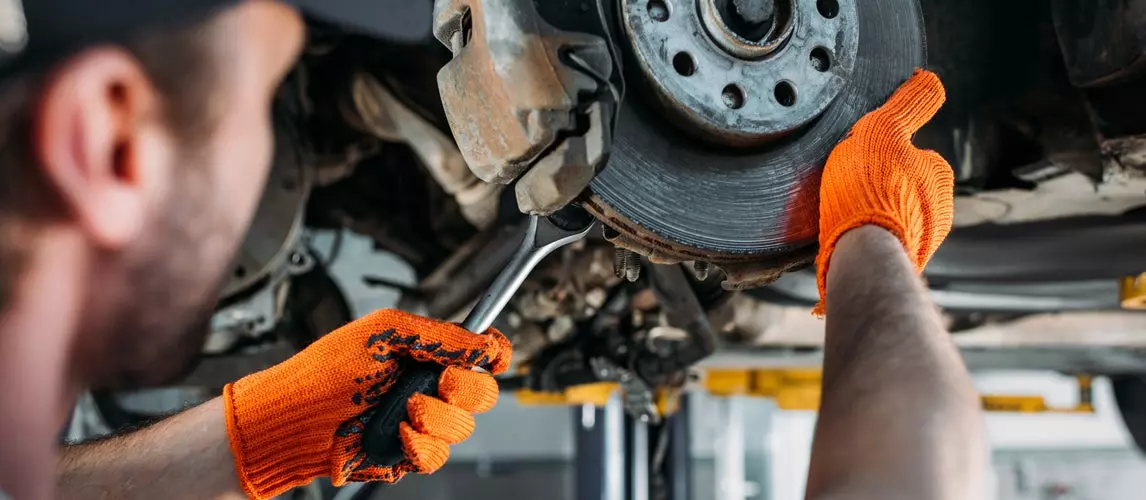Your car is your pride and joy, and from time to time, it is going to need a little loving care and attention. And just like choosing a doctor to look after your own health, selecting the right mechanic will go a long way towards ensuring that your car remains in tip-top competition. Unfortunately, there are far too many untrustworthy mechanics out there who will do a shoddy job on your vehicle, overcharge you for their services, and even perform some unnecessary ones.
To help you navigate the difficult task of choosing a car mechanic for your motor, we are going to talk you through our top 10 points to bear in mind. If you perform each one of these checks and measures, this will help to boost your chances of finding the high-quality motor specialist that you are looking for. And once you find them, you can keep returning time and time again whenever you have a problem with your car.
Ask for Personal Recommendations
If a close friend or family member is willing to personally vouch for the reputation of a mechanic, this gives you a good idea that they are trustworthy. You can ask them as many questions as you like about the quality of the work, how long it took to complete and how much it cost. Better still, if you have a friend who is a serious petrol head, they are much more likely to provide you with a quality recommendation. And if you have a friend who has a similar make and model of vehicle to yourself, you could really be onto a fantastic endorsement! Even if you don’t know anyone directly, if you put the word out there in your social circle, you may be able to get some advice from a friend-of-a-friend. Of course, you may not want to go on a single recommendation alone, but it certainly helps.
Scour the Internet
An obvious solution, but one which is still worth mentioning is searching the internet for mechanics. And with the growing popularity of writing reviews these days, you can easily find out what others are saying about the various mechanics in your local area. Websites such as Yelp provide you with a good general overview of all sorts of mechanics. Another source of information is car forums. However, you should be wary of too many glowing reviews and too many highly negative ones. A single five-star or one-star review won’t give you a full picture. A good rule of thumb is to always check see what the people in the middle are saying. At the very least, the internet will provide you with an idea of who is available, as well as their contact information so that you can get in touch personally.
Search for a Mechanic Who Specialises in Your Car Model
Plenty of garages and mechanics specialise in particular brands and manufacturers. And since they are repairing certain types of car day in, day out, you will be more confident that they have dealt with a wide range of possible faults which could be causing a problem to your vehicle. As well as this, specialist mechanics are also much more likely to have up-to-date training and access to the latest equipment. This means that you don’t have to wait around while a specific part is ordered. Of course, the downside to this approach is that you will often pay more for a specialist mechanic. But if you need some complicated work completed, this may well end up being the option which provides you with the greatest peace of mind.
Check for Accreditations
Next up, you should see if the shop or mechanic boasts any accreditations or credentials to provide you with more assurances. Some repair shops require their mechanics to jump through hoops and attain certain standards to work there – particularly the bigger brands.
You will also find that some mechanics are certified by the manufacturers to work on specific types of cars, and this can go a long way towards putting your mind at ease. But if you are going to check for these accreditations, you need to get a better idea of what they mean in the first place. A quick internet search will tell you whether they have had to pass tests or obtain a certain proficiency level for their skills. Of course, just because a mechanic doesn’t have these qualifications, it doesn’t necessarily mean that they don’t know what they are doing. If they don’t have them, you should ask a few more questions to determine their skill and experience levels.
Give the Shop a Test Run
The time when your car needs major repair work is the real test of a mechanic. Rather than waiting for this, you could give your potential new mechanic a ‘test drive’ with some smaller repair work or perhaps just some general maintenance. As well as testing out the speed and efficiency with which they complete the work, you will also get a better idea of what their general demeanour towards you is like. Are they helpful in explaining what work they will be undertaking or are they simply looking to confuse you with jargon? Do they answer your questions in a satisfactory way?
At some of the bigger shops, you may only speak with a receptionist who books you in for the work to be completed. But you should try to speak with the mechanics themselves if this is possible. To start off with, you could take your car in for something as simple as an oil change. If you feel comfortable that the smaller repair work has been done well, you have a better idea that you can trust them with the bigger stuff.
Convenience, Parts, and Service
These are all factors which can end up adding to your overall repair bill. Convenience has to play a part in your decision-making process. Sure, a mechanic may have a stellar reputation, but if you have to drive miles out of your way to access their services, they may not be the best choice for you. All of this extra travelling and inconvenience is only going to add more digits onto your overall bill. Of course, at the other end of the scale, the mechanic who is located just at the end of your road isn’t always the best option. Finding the right mechanic is something of a balancing act.
You should also find out about the type of parts which the mechanic is using. It is easy enough to do a quick Google search of the prices that you are being quoted to avoid getting ripped off. The other major cost is the price of the service. If you get several quotes from a number of different mechanics, you can easily compare and contrast the bottom lines. Don’t automatically assume that the highest price is going to be the best or the cheapest is going to be the worst. Once you have a diagnosis of what is wrong with your car, you should then find out how long a repair typically takes to help ensure that you are not being billed for hours of work which could be completed in a matter of minutes.
Check in with Local Transportation Companies
It is safe to assume that your local taxi firm or bus company are going to use a quality mechanic, so why not put in a call with them to find out who they use? Just a couple of phone calls could help to put you in contact with a reputable mechanic who you use for years to come. Another option is to steer the conversation onto mechanics the next time you are in the back of an Uber. The more information that you have to work with, the more likely it is that you are going to make the right decision. In fact, anyone who you can speak to who has a specialist knowledge of cars or transportation is always worth talking to.
Find Out About Years of Experience
The number of years that a garage or mechanic has been in business can go a long way towards giving you an idea of how trustworthy they are. If this information isn’t clearly displayed, there is no harm in asking the question. And though this isn’t always an accurate measure of how good their services are, coupled together with some of the other points we have discussed above, it can help to tell you that they must have been doing something right all these years. In the modern age of internet reviews, it is much harder for cowboy mechanics to keep getting away with it for a long period of time.
Research Your Car
If you are the kind of person who turns up to a mechanic and just nods along pretending that you know exactly what they are talking about, now is the time to change this! Having a better idea of your car’s anatomy will help you to understand the type of work which the mechanic is proposing. As well as the information available online, you should also give your car manual a closer inspection. To start off with, you can simply learn about the specific parts of your car and how they interact with one another.
Next up, you can start to research the most common faults and what to look out for. This way, when a mechanic is suggesting a particular repair, you can question them in greater detail about why they are choosing to go down this path – and actually understand what they are talking about! When a mechanic knows that they are speaking to someone who has a decent level of knowledge, this can play a big part in ‘keeping them honest’.
Trust Your Gut
The final piece of advice which we are going to offer is to simply trust your gut. When you first walk into the shop, what do you notice? Does it look clean and professional? How long did it take to be greeted and what impression did you get about the mechanic? Is the place busy? Are there a high number of cars which are being serviced? Perhaps you have driven by the garage several times and have seen the same cars time after time. Obviously, this is never going to be a good sign.
There is no doubt that it can be intimidating walking into a mechanics for the first time, but if they put your mind at ease right from the offset, this can really help you to put your trust in them. If you are happy with what you see, you could try sending your car in for the basic repair work which we discussed earlier.
When you get your car back again, you should complete a thorough inspection of it to check its condition. Are there protectors placed on the seats and floors? Maybe it hasn’t been cleaned as thoroughly as you think it should have been. Ultimately, these are a few of the things which could end up sounding alarm bells in your head. And it is usually a good idea to go with your instincts when it comes to mechanics.
Finding a good mechanic is often a challenging task, but the 10 points listed above can go a long way towards helping you to achieve this goal. Try to use several of these checks together with one another – or even all of them – to get the best idea of whether or not your would-be mechanic is trustworthy and reliable. Once you have found the mechanic for you, you can build up a relationship which lasts for years to come. This way, whenever you need some repair work on your motor, you will be confident that it will be done well, the price is right, and you will get back on the road as soon as possible.
Sources:
- How to Find an Honest and Reliable Mechanic, The Art of Manliness










Victoria
I've been looking for services that can assist my brother with car maintenance because he just purchased a new vehicle. It's good that you pointed out that having a better understanding of the anatomy of your car will help you comprehend the kind of repairs that a mechanic might suggest to you. I'll make sure to let him know about this so he can keep it in mind and look into local mechanics who might be able to assist him if necessary. https://www.dawesautomotiveservice.com.au/